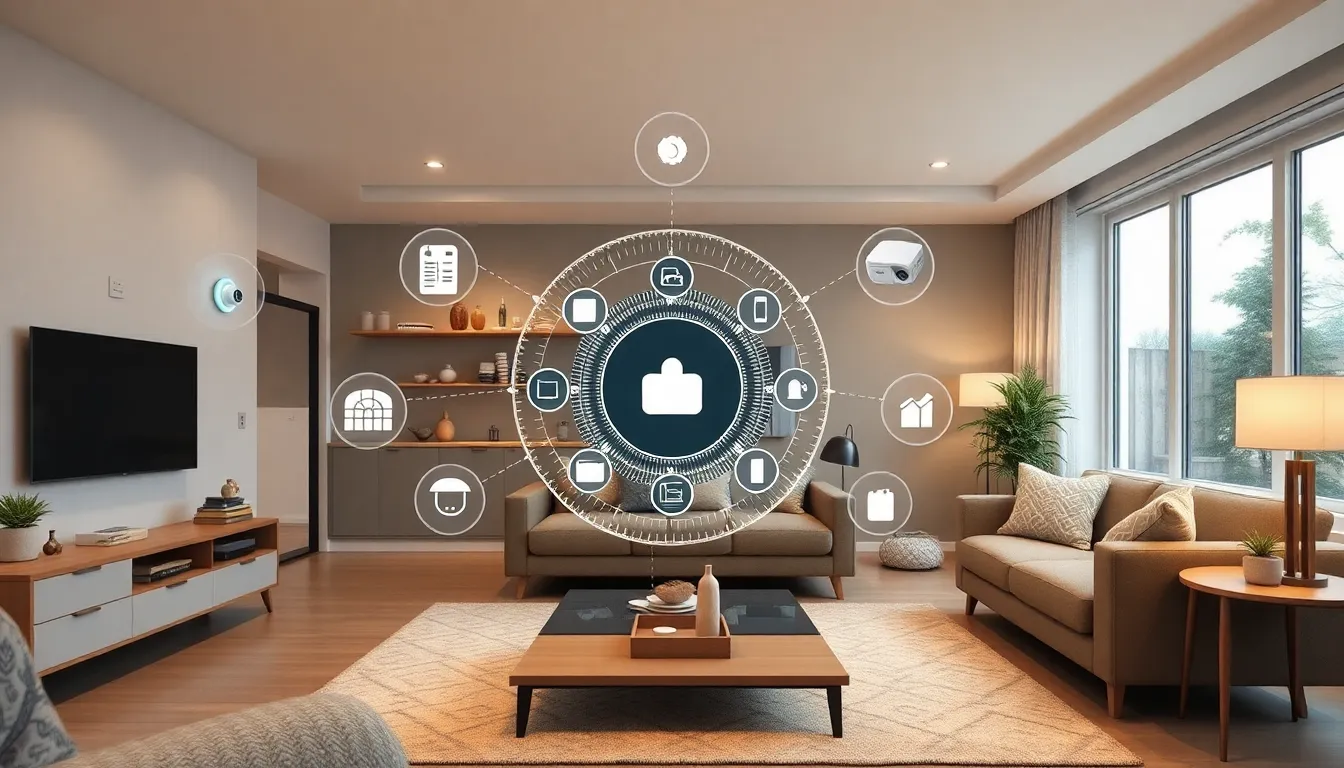Table of Contents
ToggleImagine a world where your home knows you better than your best friend. Welcome to the future of smart homes, where technology and comfort collide in the most delightful ways. Picture this: your fridge reminding you when it’s time to stock up on snacks, your lights adjusting to your mood, and your thermostat knowing just how chilly to keep things while you binge-watch your favorite series.
Future of Smart Homes: An Overview
Smart homes will continue evolving with advancements in artificial intelligence and the Internet of Things (IoT). This evolution leads to more interconnected devices that communicate effortlessly. Predictive analytics enhances energy management, allowing homes to optimize resource consumption based on habits.
Home automation systems integrate various devices, enabling environments to adapt to user preferences. For example, automatic lighting adjusts based on occupancy, which improves energy efficiency. Voice-activated assistants streamline interactions, allowing users to control appliances simply by speaking.
Security features also advance with smart home technology. Smart locks and cameras provide real-time monitoring and alerts. These systems can distinguish familiar faces from strangers, enhancing safety measures.
Connectivity represents a crucial aspect of smart homes. 5G technology significantly boosts internet speed and reliability, allowing devices to perform more functions in real time. Seamless integration among devices enhances user experiences by ensuring smooth operation and coordination.
Sustainability considerations play an essential role in the future. Smart homes utilize energy-efficient appliances and renewable energy sources to minimize their carbon footprint. Households equipped with smart meters can monitor their energy usage actively, leading to informed decisions about consumption.
Real estate will shift as consumers increasingly demand smart features. Homes with advanced technology command higher market values. Construction trends will favor tech-ready homes, prioritizing smart installations during the building process.
Ultimately, the future of smart homes leverages modern technology to create more efficient, convenient living environments. Emphasizing comfort and sustainability, these homes not only enhance daily routines but promote energy conservation and safety.
Key Technologies Shaping Smart Homes

Key technologies drive the evolution of smart homes, enhancing functionality and user experience. As these advancements progress, they create an interconnected ecosystem.
IoT Integration
IoT integration enables seamless communication among household devices. Sensors monitor activity levels, allowing automation systems to adjust settings based on real-time data. Various appliances, such as thermostats, lights, and security cameras, connect to a central hub, streamlining control. Households can expect increased efficiency with devices that learn user preferences over time. Personalized experiences emerge as smart devices collaborate, making everyday tasks easier.
Artificial Intelligence and Automation
Artificial intelligence fosters automation, providing intuitive responses to user commands. Machine learning algorithms analyze behavior patterns, enabling devices to anticipate needs. For instance, smart thermostats adapt temperatures according to occupancy schedules, enhancing energy efficiency. Voice-activated assistants contribute by simplifying control over multiple devices, promoting convenience. Homeowners appreciate increased security as AI enhances surveillance systems, distinguishing between familiar and unfamiliar faces. Advanced automation ensures a responsive living environment, prioritizing comfort and efficiency.
Benefits of Smart Homes
Smart homes offer numerous advantages that enhance daily living experiences. These benefits range from increased convenience to improved energy efficiency, establishing a more sustainable lifestyle.
Enhanced Convenience
Adjustable smart lighting allows users to set the mood instantly, creating the perfect atmosphere for any occasion. Voice-activated assistants enable effortless control over devices, streamlining tasks and reducing manual effort. Smart appliances, such as programmable coffee makers, prepare breakfast with a simple command. Remote access lets homeowners manage their devices from anywhere, increasing flexibility and comfort. Automated systems learn individual preferences, ensuring settings match user habits effortlessly.
Energy Efficiency and Sustainability
Energy-efficient appliances play a critical role in smart homes, significantly lowering utility bills. Smart thermostats optimize heating and cooling, adjusting temperatures based on occupancy and time of day. With real-time energy monitoring, homeowners gain insights into their consumption patterns, encouraging conscious usage. Solar panels integrated into smart homes reduce reliance on non-renewable energy sources. Overall, adopting these technologies contributes to a smaller carbon footprint and promotes sustainable living practices.
Challenges Facing Smart Homes
Smart homes face several challenges that can impact their functionality and user adoption. Addressing these hurdles is essential for realizing the full potential of smart technologies.
Security Concerns
Security risks pose a significant challenge to smart homes. Hackers can exploit vulnerabilities in devices, compromising user privacy and safety. Smart locks and cameras, while enhancing home security, may also introduce weaknesses if not adequately protected. Data breaches can result from inadequate encryption and vulnerability in connected devices. To mitigate these risks, users must implement strong passwords and regular software updates for their devices. Trusted security protocols play a crucial role in safeguarding personal information.
Interoperability Issues
Interoperability remains a notable issue in the smart home landscape. Different manufacturers often develop devices that use various communication protocols, leading to compatibility challenges. Users frequently find it difficult to integrate products from multiple brands into a cohesive system. This lack of uniformity can frustrate consumers who expect seamless interactions among devices. Establishing universal standards could enhance compatibility and improve user experiences. Collaborations among tech companies might also foster a more integrated ecosystem in the smart home industry.
Innovations on the Horizon
Innovations are set to redefine the smart home landscape significantly. Progress in several areas accelerates this transformation, enhancing user experience and efficiency.
Emerging Trends
Smart home ecosystems are moving towards voice-first interactions. Advanced AI enables smart devices to understand and process natural language, improving user interfaces. Moreover, health monitoring features are increasingly integrated into smart appliances, allowing real-time tracking of wellness metrics. Additionally, sustainability technologies are gaining traction, with smart energy management systems that optimize consumption based on user behavior. Enhanced connectivity solutions, including more robust mesh networking, are expanding device reliability and coverage, ensuring a seamless user experience.
Predictions for the Next Decade
Looking ahead, seamless integration across devices promises a standardized smart home experience. Compatibility among various manufacturers is likely to improve through industry-wide collaborations. Cybersecurity advancements will become essential, with autonomous systems designed to detect and mitigate threats preemptively. Furthermore, energy exploitation will increase, with homes harnessing solar and wind power more efficiently. Advancements in machine learning will tailor recommendations to user preferences, enhancing personalization. These predictions reflect a shift towards homes that intelligently respond to lifestyle needs and environmental considerations.
The future of smart homes is bright and full of potential. As technology continues to advance, homes will become increasingly intuitive and responsive to individual needs. Enhanced connectivity and interoperability will streamline user experiences, making daily tasks easier and more efficient.
With a strong focus on sustainability and energy conservation, smart homes will not only improve comfort but also contribute to a greener future. As consumers demand these innovative features, the real estate market will adapt, prioritizing tech-ready homes that meet modern expectations.
While challenges like security and compatibility remain, ongoing innovations promise to address these issues. The evolution of smart homes will ultimately redefine living spaces, creating environments that prioritize convenience, safety, and sustainability.






